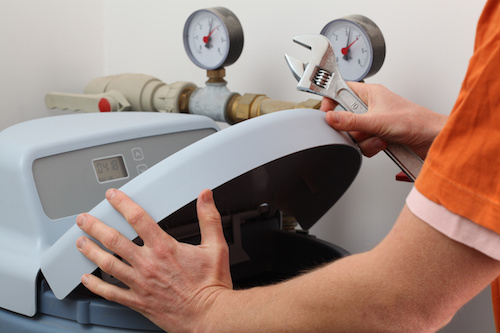 (412) 364-9114
(412) 364-9114

After 40 years in the plumbing business here in Pittsburgh, we’ve seen just about every water quality issue you can imagine. From rusty-tasting tap water to stubborn mineral buildup clogging pipes, water problems are more common than most homeowners realize. That’s why we get asked almost daily: “Should I get a water softener or a whole-house filtration system?” The truth is, both can dramatically improve your water quality, but they tackle different problems.
Think of a whole-house filtration system as your home’s bouncer – it stops the bad stuff from getting in. These systems install right where your main water line enters your home, treating every drop of water before it reaches your faucets, shower, washing machine, or dishwasher.
These systems use several different methods to clean your water:
The beauty of a whole-house system is that it protects everything. Your morning shower won’t smell like chlorine, your clothes will come out of the wash cleaner, and your expensive appliances will thank you for the filtered water.
Now, water softeners are more specialized. They have one job, and they do it extremely well: they remove the minerals that make water “hard.”
In Pittsburgh, hard water is a real issue. You’ll know you have it if you see:
Hard water is loaded with calcium and magnesium. While these minerals aren’t harmful to drink, they wreak havoc on your plumbing system and appliances. I’ve replaced countless water heaters, washing machines, and dishwashers that failed prematurely because of hard water damage.
A water softener uses ion exchange to swap those troublesome calcium and magnesium ions for sodium ions. The result? Water that rinses clean, protects your pipes, and makes everything from bathing to laundry more effective.
You’ll find two main types of water softeners:
Salt-Based Systems: The traditional workhorses that use salt to regenerate the resin beads that do the actual softening. They’re highly effective but do add a small amount of sodium to your water.
Salt-Free Systems: These don’t actually soften water in the traditional sense. Instead, they condition it by changing the structure of the minerals so they don’t stick to surfaces as easily. They’re great for people who need to watch their sodium intake.
Go with a whole-house filtration system if:
Choose a water softener if:
Consider both if:
Many of our customers end up with both systems working together. A softener handles the hard water, while a filtration system takes care of taste, odor, and other contaminants. It’s the ultimate one-two punch for water quality.
If you’re tired of dealing with hard water stains, chlorine taste, or any other water quality issues in your Pittsburgh home, give us a call. We’ll test your water, explain your options, and recommend the right system for your specific needs and budget.
Don’t put up with it another day when there’s a solution that can improve your family’s daily life. Call Terry’s Plumbing at (412) 364-9114 or visit us on our website. With over 35 years of experience serving Northern Pittsburgh families, we’re here to help you get the clean, soft water your home deserves.